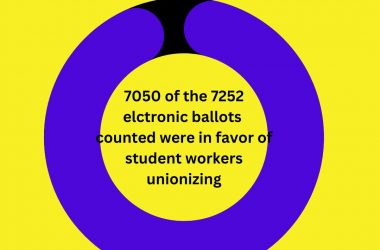With just nine weeks before contract renewal with California State University, the CSU Employee Union has recently began the bargaining process of their contract in order to secure and better the rights of employees covered by the union.
The CSUEU represents approximately 16,000 employees across all 23 CSU campuses. According to the union’s website, the primary focus of the union is in protecting, maintaining and enhancing wages, hours and working conditions for all represented members.
So far, five separate bargaining meetings have taken place, but both sides have not been able to reach a middle ground on the changes to the contract. Changes, which on behalf of the employee union include: retirement benefits, reducing restrictions on vacation requests to allow for emergencies and a salary increase.
Pat Gantt, who is president of the statewide employee union, has previously expressed the importance of the union.
“Our purpose is to maintain the highest possible quality of life of all our members and their families by negotiating a strong living wage, augmented by employer and union benefits,” Gantt said.
The contract, which has a deadline of June 30, has two separate representatives who deal with the current bargain: one team representing the CSUEU and another representing the CSUs.
Those who may be affected by the contract will be the union employees under; health care, operations, administrative and technical support.
The president of CSULB’s employee union chapter, Jennifer Moran, expressed her frustration with the meetings as she said that the latest bargaining session was difficult.
The CSUEU proposed a preamble to the contract that presented an established set of basic rights that the union believes they should be entitled to as employees. Some propositions included were competitive compensation structure, promotional opportunities, work in a secure and safe environment and transparency in decisions that may affect the staff.
“They flat out rejected it. They wouldn’t even negotiate it. They had no interest, and we strongly, strongly disagree,” Moran said.
John Ciulik, organizing chair at CSULB’s union chapter, said that it was important for people to learn more about the employee union. Ciulik often takes time out of his schedule to personally reach out to people and tries to find areas where individuals might be underrepresented.
“We have to make sure that people are aware of what are their rights by the contract,” Ciulik said.
He explained that the CSUEU has also gone to Sacramento and lobbied on behalf of systemwide issues that not only impact the union, but may also affect everybody else within the CSU.
“This is a huge, huge machine. There half a million students in the CSUs,” said Ciulik.
In CSULB’s employee union chapter alone, there are a little over 1,200 union employees who all depend on the rights and benefits that come written in the contract they sign when they get hired, some benefits which may also extend to family members.
“It’s not just those 16,000 employees, it’s their spouses, children, maybe their dependent parents. You can’t just make rash impulse decisions, these are people’s lives,” Ciulik said.
During the first bargaining meeting, both ends made no progress, and according to a newsletter from the statewide CSUEU, it was announced that the CSU administration’s proposal “seeks to make yet-to-be-disclosed changes to the benefits and layoff sections of the contract, among other proposed adjustments.”
The next bargaining session, which will be on May 25 and 26, will be the sixth one to take place and the union will once again try to propose a middle ground in which both sides can agree on.
“It’s a constant give and take over the course of several, several months, so it’s an ongoing process,” said Moran.
With five bargaining meetings already having taken place, one of the most pushed-for changes within the contract is the salary of employees. According to Moran, the CSUEU is the only state agency that does not have a “step system.”
In the previous bargaining meeting, Rocky Sanchez, vice president for representation spoke on the possible change.
“Our proposed Article 20 (salary) overhaul introduced multiple methods to provide our members with predictable movement through their salary ranges over time,” Sanchez said.
In usual work settings, it’s common for employees to move up in salary after years of work, satisfactory performance evaluations, or when moving up in position, for union employees however, that is not the case.
“You can be here for 10 years and never move out of that quartile,” said Moran.
If there is no tentative agreement by June 30, both parties will have the option to extend their current contract, which does not include any of the changes that both sides have presented. The extension will be on a month-by-month basis and will extend until both sides reach a mutual agreement.
“…From the moment that you submit your application, to the moment you graduate, every part of that does actually fall into our [employees’] area of expertise. We want you to be aware of it and want you to be interested,” said Moran.



